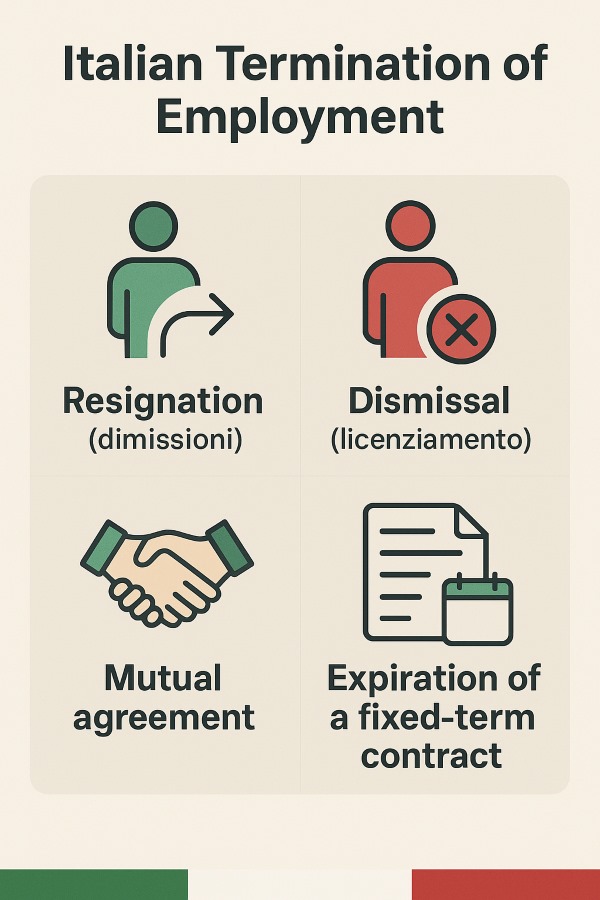In Italy, ending an employment relationship is more regulated than in many other countries. Employers cannot dismiss workers “at will.” Instead, there must be clear legal grounds and a formal process.
Employment can end in four main ways:
- Resignation (dimissioni) by the employee
- Dismissal (licenziamento) by the employer
- Mutual agreement between both parties
- Expiration of a fixed-term contract
Each option has its own rules for notice, paperwork, and financial obligations. Mistakes can be costly, leading to reinstatement orders or financial penalties for employers.
Table of Contents
ToggleWho is Eligible for Employment Termination in Italy?
All employees in Italy with regular work contracts are protected by termination laws. This applies to both full-time and part-time staff, but the level of protection can differ depending on several factors.
One major factor is company size. Employees in companies with more than 15 workers have stronger protections and employers must follow stricter procedures when dismissing them. In smaller firms, the rules are less demanding.
Another important factor is the hiring date. Employees hired before March 7, 2015, are covered by the older system, which gives them stronger rights to reinstatement if dismissed unfairly. Those hired after that date fall under the Jobs Act, where compensation is the main remedy instead of reinstatement.
Essential Documents Required for Termination
Employers must prepare comprehensive documentation before proceeding with any termination. The primary requirement is a written termination notice signed by the company’s legal representative, clearly stating the specific reasons for dismissal. This notice can be delivered personally, by registered mail, or telegram, but written proof of delivery is mandatory.
Additional required documentation includes
- evidence supporting the termination grounds
- copies of applicable national collective bargaining agreements
- records of any disciplinary procedures followed
- witness statements or incident reports for misconduct cases.
For economic dismissals, employers must also prepare business justification documents, financial statements, and records of alternative solution attempts.
Valid Grounds for Termination
In Italy, employers cannot fire employees without a valid reason. The law allows dismissal only under specific circumstances, grouped into three main categories.
Just Cause (Giusta Causa)
This applies to very serious misconduct, such as theft, fraud, or other actions that destroy trust. In these cases, the employer can dismiss the employee immediately without notice.
Justified Subjective Reason (Giustificato Motivo Soggettivo)
This applies to less serious misconduct or contract violations by the employee. The behavior is enough to allow dismissal, but not as severe as just cause. In these cases, the employer must follow disciplinary steps and give proper notice.
Justified Objective Reason (Giustificato Motivo Oggettivo)
These are business-related reasons for termination, such as company restructuring, technological changes, or economic difficulties. The employer must demonstrate genuine operational necessity and cannot use economic reasons as a pretext for discriminatory dismissals.
Notice Periods and Payment Requirements
For employees in Italy, notice periods depend on collective bargaining agreements and vary by job type, years of service, and seniority. By law, the minimum is 15 days for employees with less than six months of service, and 30 days for those with more.
In practice, most agreements give employees much longer notice periods, often from one month to several months, depending on their role and how long they’ve worked for the company.
Instead of having the employee work during the notice period, employers can pay them compensation. This payment must cover not only their regular salary but also any benefits or extra monthly payments they would have earned.

Severance Pay and Mandatory Payments
When the termination agreement is ready, all employees who leave a job are entitled to Trattamento di Fine Rapporto (TFR), the mandatory severance pay. It equals about one month’s salary for every year worked, calculated by dividing the yearly salary by 13.5. The TFR builds up during the entire job and must be paid no matter why the contract ends.
Besides TFR, employees must also be paid for any unused vacation days, unpaid wages, and a share of any extra monthly payments included in their contract or collective agreement.
Disciplinary Procedures for Employee Misconduct
When termination is based on employee behavior, Italian law requires employers to follow strict disciplinary procedures. The process begins with providing the employee a written notice detailing the specific misconduct or breach of contract.
The employee then has five days (or a longer period specified in the applicable collective agreement) to provide written or oral justifications for their actions. If providing oral justifications, the employee has the right to be assisted by a trade union representative during the meeting.
Only after this period expires, or after reviewing the employee’s justifications, can the employer proceed with disciplinary termination. Failure to follow these procedural requirements can render the dismissal invalid, even if valid grounds for termination existed.
Economic Dismissals and Conciliation Procedures
For employees hired before March 7, 2015, dismissals for economic or business reasons require extra steps. If the company has more than 15 workers, the employer must first send a written notice to the local labor inspectorate and to the employee.
Within seven days, the labor office arranges a conciliation meeting with the provincial commission. This meeting is mandatory and should be completed within 20 days, unless both sides agree to extend it.
Only after this process is finished can the employer move forward with the dismissal.
Collective Dismissals and Mass Layoffs
When an employer needs to dismiss five or more employees within 120 days, collective dismissal rules apply. This can involve workers from the same workplace or different locations within the same province.
The employer must inform employee representatives and trade unions in writing. The notice must explain the reasons for the dismissals, how many workers will be affected, and the planned timeline.
After that, there is a consultation period where both sides meet to discuss the reasons and possible alternatives. Even if no agreement is reached, this process must be completed before the employer can issue dismissal notices.
Probationary Period Dismissals
During the probation period (usually up to six months, depending on the job), ending employment is much easier. Either the employer or employee can terminate the contract without giving reasons or following standard disciplinary steps.
However, employers cannot shorten or cancel the agreed probation period, since it gives the worker a fair chance to show their skills. If the employer cancels the contract before the start date, they may face claims for damages.
Employee Rights and Legal Protections
Italian law offers strong protection against unfair dismissal. Some dismissals are always invalid, such as those based on discrimination, pregnancy, marriage, or union activity.
If an employee feels they were dismissed unfairly, they can challenge it within 60 days by written notice and must file a court claim within 180 days. Remedies vary depending on when the employee was hired, the employer’s size, and the dismissal type.
Separation Agreements and Mutual Termination
Many employment relationships in Italy end through mutual agreement rather than unilateral dismissal. These separation agreements typically include the employee waiving potential claims against the employer in exchange for additional compensation beyond the mandatory payments.
To be legally binding, separation agreements must be executed before specific bodies such as trade unions, labor offices, or through the assisted negotiation procedure introduced by recent reforms. This requirement protects employees by ensuring they receive proper guidance before waiving their rights.
Final Remarks
Italian employment law sets clear rules for ending a work relationship, ensuring that dismissals are based on valid grounds and handled with transparency. Employers must follow formal procedures, respect notice periods, and provide mandatory payments such as TFR.
The level of protection depends on factors like company size, hiring date, and contract type, while collective agreements often add further safeguards. Mistakes in the process can expose employers to reinstatement orders or financial penalties.
Scratchpad
- Valid endings: resignation, dismissal (just cause / justified subjective / justified objective), mutual agreement, fixed-term expiry, probation end.
- TFR owed in all cases: TFR/year ≈ annual salary ÷ 13.5; total TFR = (annual ÷ 13.5) × years of service (pro-rated).
- Notice: law states ≥15 days (<6 months service) or ≥30 days otherwise; CBAs often longer. If employer pays in lieu, compensation must include salary + benefits + extra monthly payments expected during the notice window.
- Other payouts: unused vacation, unpaid wages, pro-rata extra monthly payments (13th/14th), any additional settlement.
- Daily rate for notice/vacation: by default annual ÷ 365; user can override.
Italy Employment Termination — Cost Estimator
Estimate employer-side termination costs aligned with the article (TFR, notice in lieu, vacation payout, pro-rata 13th/14th, unpaid wages, settlement).
1) Employee & Contract
2) Notice Handling
3) Extra Monthly Payments (13th/14th)
Pro-rata extras owed at termination: extras × (months worked this year ÷ 12) × monthly salary.
4) Vacation & Other Items
Estimated Employer Termination Cost
This tool applies the article’s principles: TFR owed in all cases; notice in lieu includes salary and (optionally) extra monthly payments; vacation and unpaid items added; pro-rata extras at year-to-date. CBAs and local rules may vary.
Notes
Check also our articles about working time in Italy, contract work in Italy, and useful informations about Italian employment contract.



